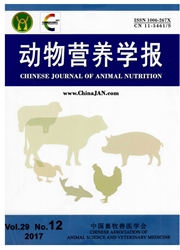

 中文摘要:
中文摘要:
本试验旨在研究不同剂量的苜草素(苜蓿提取物)对肉仔鸡免疫、内分泌和脂类代谢的一些指标的影响。240只1 d商品代AA雄性肉仔鸡随机分为4组。对照组饲喂基础日粮,处理组日粮中分别添加100、300和500 mg/kg苜草素。分别于28、35、42和49 d从每组取6只鸡,称重、心脏采血后处死,剥离腹脂并称重。分离血清后,进行新城疫血凝抑制抗体效价、甲状腺素、胰岛素、甘油三酯和总胆固醇水平的测定。结果表明,添加500 mg/kg苜草素分别在不同日龄显著提高了(P〈0.05)新城疫血凝抑制抗体效价和血清甲状腺素水平,显著降低了(P〈0.05)腹脂率、血清甘油三酯水平、总胆固醇水平和胰岛素水平;添加300 mg/kg苜草素显著升高了(P〈0.05)血清甲状腺素水平和显著降低了(P〈0.05)甘油三酯和胰岛素水平;添加100 mg/kg苜草素对这些指标没有显著影响。由本试验结果可以看出,日粮中添加苜草素(500 mg/kg)可以增强肉仔鸡体液免疫能力、调节甲状腺素和胰岛素的分泌,并且具有明显的降脂作用。
 英文摘要:
英文摘要:
This trial was conducted to investigate the effect of Polysavone,a kind of alfalfa extracts, on some parameters of immunity,incretion and lipid metabolism in broiler chickens. Two hundred and forty 1-day old male commercial Arbor Acres broiler chickens were randomly distributed to four groups (60 × 4):Control group,treatment 1,treatment 2 and treatment 3. Control group was fed a basal diet and three treated groups received diets with supplements of 100,300,500 mg/kg Polysavone respectively. Each of six broilers randomly selected from each group was weighted and blood was obtained by heart puncture,and abdominal fat pad was removed and weighted at days 28,35,42 and 49 respectively. The titers of antibody against new castle disease virus(NDV)were determined by hemagglutination inhibition test and the level of thyroxin (T4), insulin, triglyceride (TG) and total cholesterol (TC) in serums were measured. The results showed that, the titers of anti-NDV antibody and the level of T4 in serum were improved (P〈0.05) significantly while the percentage of abdominal fat and the content of TG, TC and insulin in serum were reduced (P〈0.05) significantly by the addition of 500 mg/kg Polysavone into diets at different age. The significant increase (P〈0.05) of T4 level and the decrease (P〈0.05) of TG and insulin content in serum were also observed in group added 300 mg/kg Polysavone. The supplement of 100 mg/kg Polysavone had no significant effects on all parameters examined. These showed that the addition of 500 mg/kg Polysavone into diets may strengthen humoral immunity function,regulate incretion of T4 and insulin and share obvious efficacy of reducing lipid in broiler chickens.
 同期刊论文项目
同期刊论文项目
 同项目期刊论文
同项目期刊论文
 期刊信息
期刊信息
